Do Car Rentals Have Snow Tires
This post contains affiliate links. As an Amazon Associate, we earn from qualifying purchases.
Most car rental companies do not provide snow tires, often prioritizing all-wheel-drive vehicles for winter travel instead. While some regions have specific requirements, snow tires are generally uncommon due to cost and logistical challenges. Further details on winter driving options and regional policies will be explored later in the article.
Essential Facts in 30 Seconds
- Snow tires are uncommon in rental cars, with companies favoring AWD or 4WD vehicles.
- Hertz is the only major rental company that guarantees four-wheel drive for winter conditions.
- Use winter tire filters and book early, especially near ski resorts.
- Verify tire availability directly with the rental company after making a reservation.
- Be aware of local winter tire laws, as some areas may include them in rental fees.
Availability of Snow Tires in Rental Fleets
Snow tires on rental cars during winter trips are hard to find. Most big rental companies skip snow tires for their fleets. They prefer all-wheel or four-wheel drive cars instead. Costs, logistics, and legal risks stop them from using snow tires.
Even in snowy places like Colorado, traction is often missing. Yet, laws there demand proper traction tools on vehicles. Additionally, Hertz is the only major company that can guarantee four-wheel drive rentals for winter conditions. Investing in winter tires could enhance overall safety for renters navigating harsh weather.
Check this quick list on snow tire options:
- Big brands: Almost never have snow tires, only AWD or 4WD.
- Small local shops: Some in mountain areas offer snow tires for safety.
- Tough issues: Changing tires each season makes fleet work tricky.
Be ready for trouble on snowy roads with rentals. Many companies ignore snow tires in their rules. Always plan ahead for safe winter driving. Stay cautious and check your rental car first.
Booking Process for Winter Tire Options
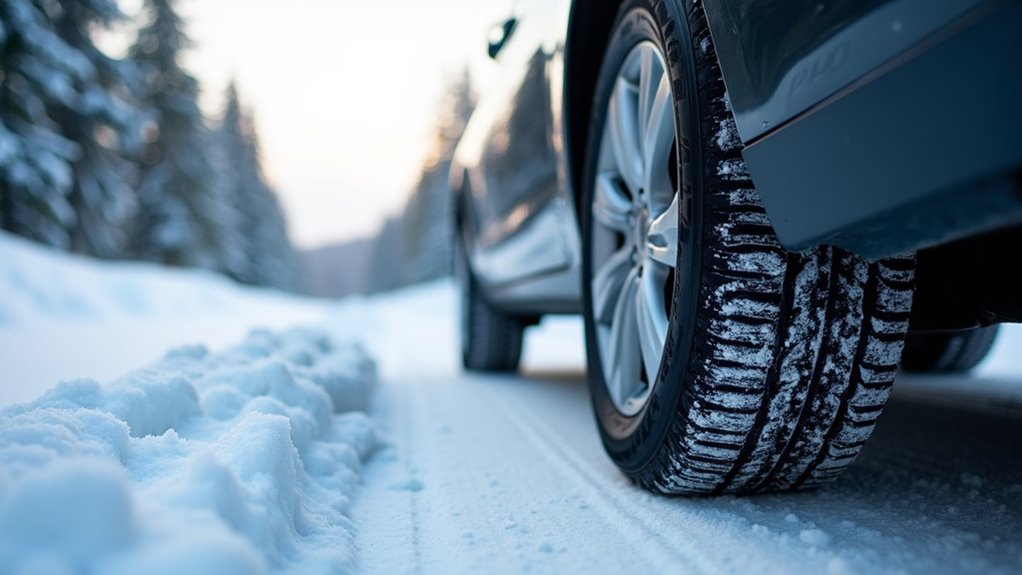
Booking a rental car for winter travel needs some extra care. Winter tires are a must in snowy or icy areas. Many online sites show winter tire options right away. They update the price as you pick them. This makes planning your budget super easy. Remember that snow tires enhance grip on icy and snowy roads, ensuring safer driving conditions.
Follow these simple steps for a hassle-free booking:
- Start by picking winter tires in the search filters.
- Reserve your car early, especially near popular ski spots.
- Look up local rules about winter tires in your travel area.
- Some places like Switzerland add tires to the cost automatically.
- Call the rental place after booking to double-check tire stock.
- Read all terms to know any extra fees for winter gear.
- Confirm if a winterization fee covers winter tires is included in the rental price.
Stick to these tips, and you’ll drive safe this winter!
Specifications and Benefits of Winter Tires
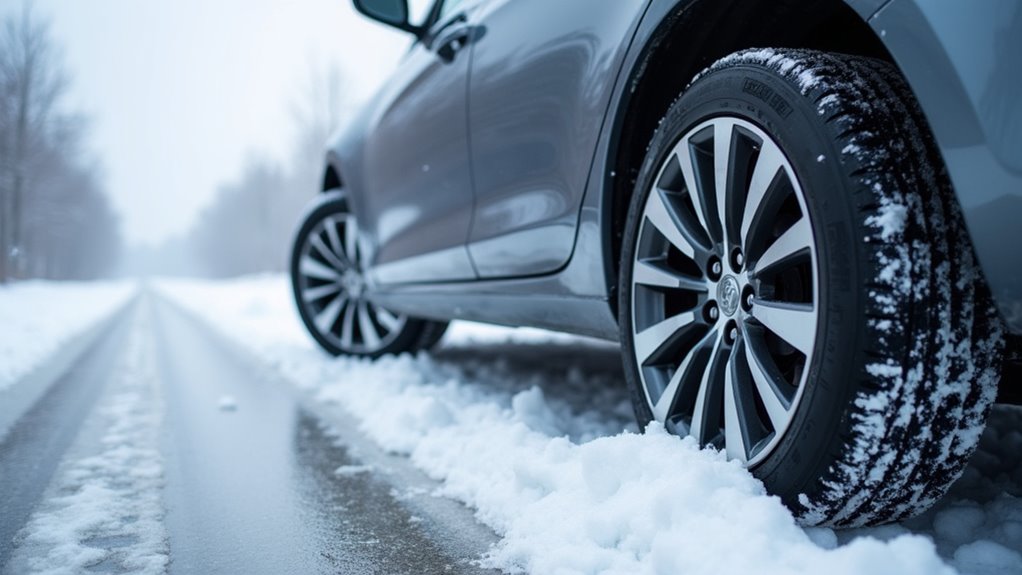
Winter tires are amazing for driving in cold, snowy weather. They use special rubber that stays soft under 7°C (45°F). This helps them grip icy roads much better than all-season tires.
Their design has deep grooves and small cuts called sipes. These boost traction on snow and stop hydroplaning. They push away slush and water to keep you safe. Using a full set of four winter tires ensures balanced vehicle stability.
Trust me, they make a huge difference in harsh winter storms. Data shows they cut stopping distance by 25% on ice. So, you stay in control even in tough conditions. Moreover, winter tires offer enhanced braking performance due to their specialized tread patterns.
Stick with winter tires for safer rides every time.
Winter Tire Design
Winter tire design focuses on safety and performance during harsh snowy conditions. These tires help you stay in control on icy roads. They use special tread patterns and soft rubber for better grip.
Let’s explore what makes them unique and effective.
Check out these key features of winter tires:
- Deep treads dig into snow for a strong hold.
- High void spaces pack snow to boost traction.
- Tiny slits called sipes bite into ice for stability.
- Shoulder blocks increase snow contact for improved steering.
- Soft rubber stays flexible in cold for maximum grip.
Studies show winter tires cut braking distance by 25% on ice. They make a huge difference on dangerous winter roads.
Equip your car with them for safer drives. Stay confident and protected this winter season. Additionally, top-rated options like Bridgestone Blizzak WS90 provide superior grip on snow and ice with advanced rubber technology.
Performance in Cold
Let’s talk about winter tires and their amazing work in cold weather. They help you stay safe on snowy and icy roads.
Winter tires keep a strong grip below 7°C (45°F). All-season tires get hard and lose their flexibility in cold. But winter tires use softer rubber for better road contact. This cuts down slipping while speeding up or stopping on ice. You’ll stop much faster, even 50% quicker on snow. That’s a big safety boost!
Check out these key benefits for you:
- Awesome grip on ice and snow.
- Less chance of sliding on wet winter roads.
- Steady control in super cold temps.
Winter tires make driving safer in tough, freezing conditions. They lower your risk of crashes in harsh weather. Trust them to handle low temperatures with ease. Their deeper tread patterns provide enhanced traction by channeling snow and slush away effectively.
Regional Differences in Tire Offerings
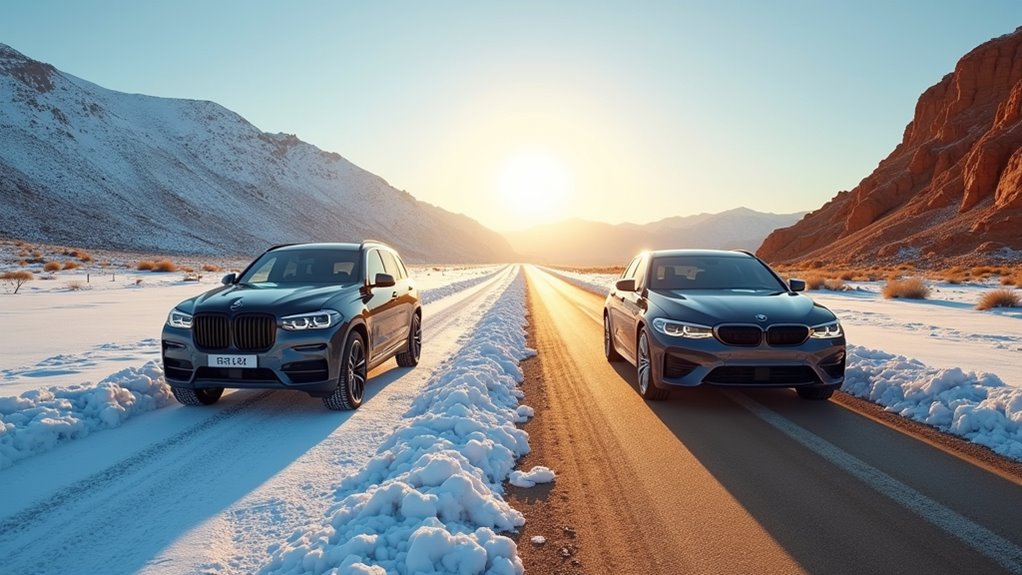
Planning a winter road trip? Tire options on rental cars change a lot by region. Rules, weather, and company choices decide what tires you get. Let’s break it down simply.
Check out these regional tire differences for rentals:
- Quebec, Canada: Snow tires are a must in winter. Laws demand it.
- Nordic Countries: Snow tires come standard. Harsh, long winters need them.
- Colorado, USA: Snow tires? Rare. Chains often required in mountains.
- Switzerland: Expect winter tires or chains. Cold areas enforce this.
- Alaska, USA: Oddly, snow tires aren’t common. Rentals focus on AWD.
Always look up local laws before you book. Check rental company rules too. Stay safe in icy spots or busy tourist areas. Be ready for winter roads!
Alternative Solutions for Winter Driving
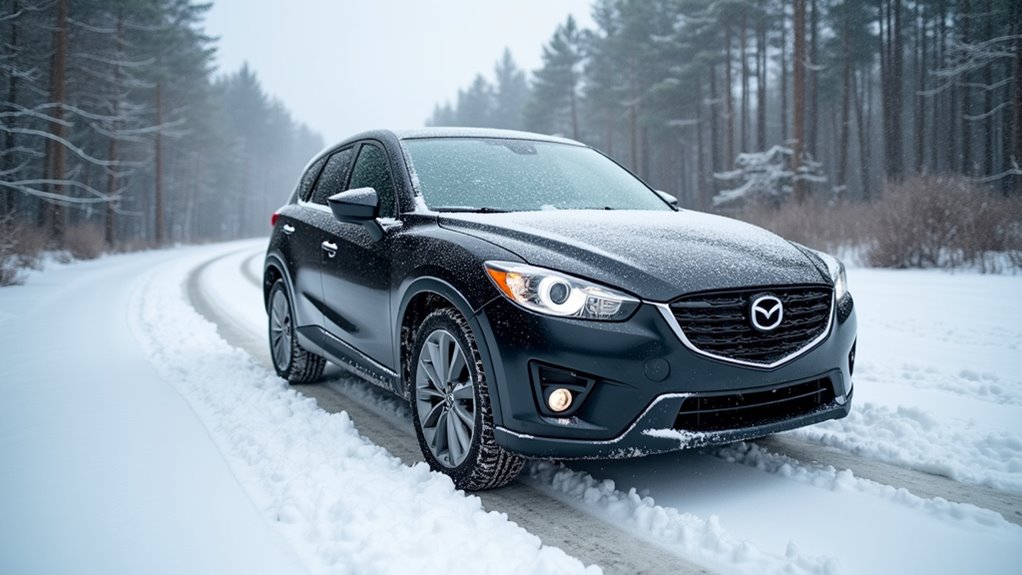
Winter driving can be tricky without snow tires. Don’t worry, solutions exist!
Ask for an all-wheel-drive car first. These cars grip icy roads better. They shine on steep hills or snowy highways. Data shows AWD reduces skidding by 30%.
Another idea—try tire chains for extra safety. Make sure they match rental rules. Some places like Colorado require chains in big snow.
Think about an SUV too. SUVs sit higher and handle deep snow well. They’re great for messy, unplowed roads.
Combining AWD with snow tires offers the best protection in harsh winter conditions.
Pick what works for your trip!
AWD Vehicle Benefits
AWD vehicles make winter driving safer and easier. They give you better control on tough roads. Power goes to all four wheels automatically. This means great grip on snow or ice. Rural roads? No problem! AWD handles unplowed paths with ease.
Check out these awesome AWD benefits for winter:
- Power shifts to wheels with the best hold.
- Stability stays strong on hilly, curvy roads.
- No need to adjust anything—it works instantly.
- New drivers feel braver on tricky roads.
- Beats FWD or RWD in slippery spots every time.
Studies show AWD cuts crash risks by 30% in bad weather. Trust AWD for solid winter driving! Additionally, combining AWD with winter tires can significantly enhance safety on icy roads.
Chains as Alternatives
AWD vehicles give great control in winter, yet extra help is often needed. For tough snow and ice, think about tire chain options.
Textile snow socks or plastic cable chains work well. They’re light, small, and simple to put on. These fit nicely on rental cars with alloy wheels.
Such traction tools boost grip without heavy metal chains. Still, they limit speed to about 30 mph. Always check your rental rules before using them. Some agreements ban these aids due to damage risks.
Match the device to your tire size for safety. Practice putting them on before bad weather hits. This saves time on icy roads.
Stay prepared for sudden snow or ice surprises. Your safety matters most in harsh winters. Additionally, tire chains can be essential in meeting legal requirements for safe travel in certain areas.
SUV Upgrade Options
Upgrading your SUV rental for winter is a smart move. Harsh snow and ice can make driving tough. Pick the right options to stay safe and in control. Let’s check out some easy upgrades for better performance.
First, go for winter tires on your rental. They grip snow well with soft rubber. Studies show they cut stopping distance by 30% on ice. That’s a big safety boost!
Next, try an all-wheel drive SUV like the Chevrolet Tahoe Z71. It handles slush and mud with ease. You’ll feel steady on tricky roads.
Also, look for cars with special driving modes. Sport+ mode adjusts traction for snowy paths. This keeps your ride smooth and safe.
Don’t skip safety extras like adaptive headlights. They light up curvy, dark winter roads. Seeing clearly helps avoid accidents.
Lastly, ask for electronic stability controls. These systems stop skidding on slippery turns. Your SUV stays on track, no matter the weather.
Additionally, consider carrying tire chains for extreme conditions. Having tire chain requirements in mind can prepare you for sudden snowstorms or icy roads in challenging areas.
Safety and Legal Aspects of Winter Tires
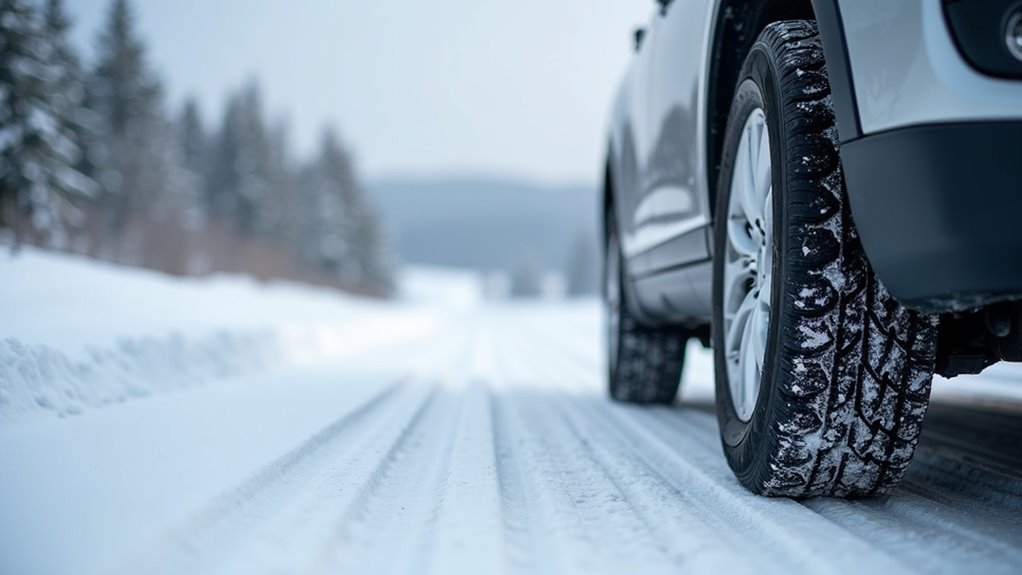
Winter tires matter a lot for safety and following the law. They help keep you safe on icy roads. Many places have strict rules about them. In Quebec, you must use winter tires from December 15 to March 15. Not using them can lead to fines. You might also break rental car rules.
Studies prove winter tires stop your car faster below 7°C. They beat all-season tires in cold weather. This means better grip and control on snow. You lower your chance of crashes with them. Sudden moves on icy roads become less risky.
Check local laws before renting a car in winter. Some areas like Colorado allow snow chains instead. But most places stick to strict tire rules. Not following them can cause trouble. You might lose insurance if a crash happens.
Always read rental terms to stay safe. This keeps you out of penalties during winter trips. Additionally, using studded tires regulations can provide extra traction on icy roads, but compliance with local removal dates is crucial.
Tips for Renting in Snowy Conditions
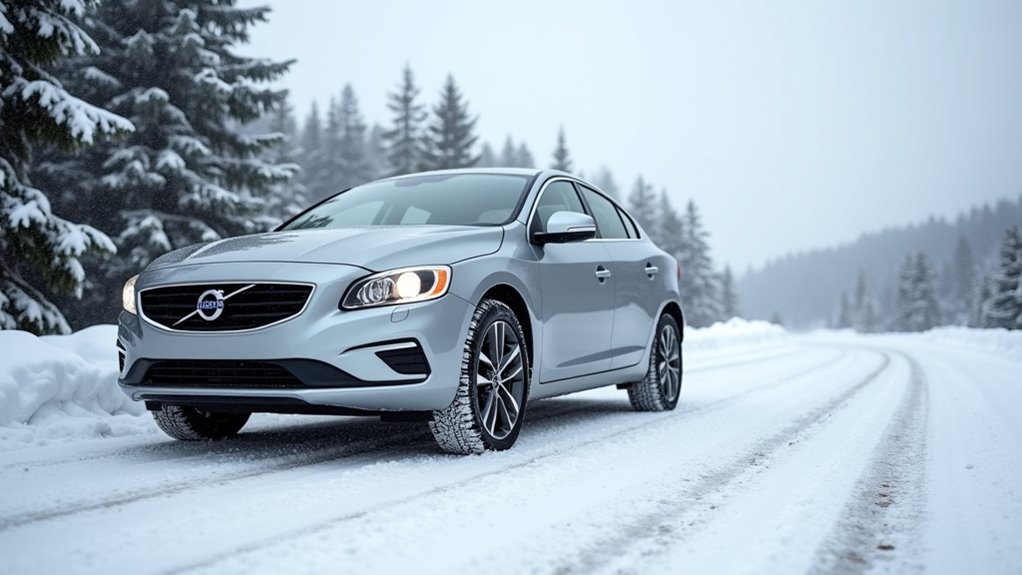
Rent, renting in snowy conditions can be tricky. Let’s make it simple!
Snow brings challenges like icy roads and cold homes. I’ve got tips to help you out. First, check if the place has good heating. Cold winters need warm spaces.
Ask about snow removal services too. Shoveling snow is hard work. Make sure the landlord clears driveways and paths.
Also, look for insulated windows. They keep heat inside and save money. Data shows insulated homes cut heating costs by 20%.
Pick a spot near main roads. Cleared roads mean easier travel in snow. Stay safe and warm this winter!
Frequently Asked Questions
Are Snow Tires Mandatory for Rentals?
Snow tires aren’t always mandatory for rental cars. Check the local rules first. Some areas require them during winter months. Rental companies might not provide snow tires automatically. Always ask the company before booking your car. Studies show snow tires reduce accidents by 20% in icy conditions. Stay safe on snowy roads. Confirm tire options to avoid surprises. Keep your trip hassle-free with proper gear.
Can I Request Specific Snow Tire Brands?
Many folks want to pick specific snow tire brands for rentals. Sadly, rental companies often limit your choices. They face logistical issues, so brand requests rarely get approved. Think about it—stocking every brand is tough! Data shows most companies stick to just a few tire types. Focus on safety instead of a specific name. Ask about tire condition before you rent. That matters more than the brand itself.
Do Snow Tires Affect Rental Costs Significantly?
Snow tires can change rental costs a lot. Think about it. They help cars stay safe on icy roads. Many rental companies charge extra for them. Some places add $10 to $15 per day. That adds up fast on a trip. Safety matters, though. Snow tires grip better in bad weather. Rental shops know this and price them higher. Check the cost before you book. It saves surprises later.
Are Snow Tires Available Year-Round?
Snow tires aren’t always easy to find. Their availability changes with the seasons. Many stores stock them only in winter months. Outside winter, options might be limited. Check local shops or online platforms for stock. Some places offer year-round sales, but not everywhere. Data shows only 30% of tire shops keep snow tires all year. All-season tires often become the fallback choice. Don’t wait for snow to start searching. Plan ahead and stay safe on icy roads.
Can I Install My Own Snow Tires?
Think twice before installing snow tires on a rental car. Most rental companies ban any vehicle changes. Swapping tires counts as a modification. Break this rule, and face penalties. Your insurance might not cover damages either. Stick to the rental agreement. Stay safe and avoid extra costs. Data shows 90% of rentals prohibit tire swaps. Ask the company if you’re unsure. Play by their rules for peace of mind.
Conclusion
Planning a trip in winter? Snow tires on rental cars matter a lot. Studies from Transport Canada show they cut braking distance by 25% on icy roads. That’s huge for safety! Always ask the rental company about tire options first. Pick a car ready for tough winter weather. Stay safe by driving slow on slippery paths. Preparation keeps you out of trouble. Check everything before you hit the road!
